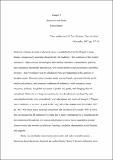Decadence and music
Abstract
The idea of decadent music may be as old as music itself, dating back at least to classical antiquity. This chapter offers a history of the concept from the classical period through the Middle Ages, the Renaissance, and the eighteenth century, before concentrating on the explosion of the idea across Europe from the mid-nineteenth century onwards. Classical writings often invoke a model of music that can be understood as proto-decadent ? for which read morally ‘bad’, formally flawed, hyper-affective, enervating, or corrupting in some way ? even if the term itself is not used. Then, as later, decadent music was perceived and defined by its effect on its listeners or by its formal properties, as Nietzsche understood Wagnerian opera in the nineteenth century. Music, it seems, has always been understood to contain the potential to disrupt and contaminate itself and its audience, requiring aesthetic, social, even state control ? control articulated via the idea of decadence.
Citation
Sutton , E S 2019 , Decadence and music . in J Desmarais & D Weir (eds) , Decadence and Literature . vol. 1 , Cambridge Critical Concepts , Cambridge University Press , Cambridge UK , pp. 152-168 . https://doi.org/10.1017/9781108550826.010
Publication
Decadence and Literature
Type
Book item
Collections
Items in the St Andrews Research Repository are protected by copyright, with all rights reserved, unless otherwise indicated.

